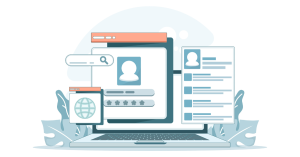Marketing automation technology, much like email marketing before it, has long been central to the essential task of sending the right message to the right person at the right time. This used to involve relatively simple workflows that typically triggered ‘batch and blast’ campaigns based on previous engagements. However, the potential of marketing automation, especially platforms like emfluence, goes far beyond this. It’s not just about sending the right message at the right time, but about creating and sending marketing campaigns that are more personalized and effective than ever before.
When properly integrated with your organization’s CRM system, marketing automation technology has the potential to turn targeted bulk sends into highly personal messages.
In this article, we’ll explore just what this evolution means to your business and how you can put it to work today.
The Role of CRM in Shaping Marketing Automation
A well-maintained CRM system is the beating heart of your organization. It’s the one place where every engagement with your customers, from the initial subscription to purchases, bill payments, and customer service issues, are recorded. This data is not just a record of past touchpoints, but a powerful tool that can transform your marketing output completely.
From Mass Campaigns to Personalized Conversations
While mass email campaigns have always had their merits, they can still fall short in terms of efficiency and effectiveness. This is because they are often based on a single marketing objective targeting a generic group of customers. In short, they lack the sophistication of more informed conversations.
Integrating your marketing automation platform with your CRM system makes it possible to create individual sends that resonate with every subscriber. Here are just some examples of how this happens:
Welcome Campaigns
When a new customer or subscriber is added to your CRM, an automated welcome email can be triggered to set the tone for your relationship. A warm, personalized message helps create a strong first impression. Meanwhile, tailored onboarding content ensures the subscriber feels valued right from the start.
Behavioral Trigger Campaigns
Behavioral triggers are some of the most effective ways to drive engagement and conversions. For example, abandoned cart emails remind customers of the items they left behind, often sweetened with a limited-time discount to prompt action. Similarly, browse abandonment emails target users who’ve viewed products or categories without purchasing, offering personalized recommendations, or highlighting similar items. Post-purchase emails are another powerful tool. After a purchase, you can thank the customer for their order while also providing tips on how to use their new product or showcasing complementary items to increase lifetime value.
Event-Based Campaigns
Event-based campaigns allow you to connect with your audience during special occasions. For instance, you can send personalized birthday emails with thoughtful messages and an exclusive discount or gift. Anniversary emails work similarly, celebrating milestones such as the customer’s first purchase or signup date with a meaningful offer. Seasonal or holiday campaigns, such as Christmas, Valentine’s Day, or Black Friday promotions, can also be tailored using CRM data to feature products or services aligned with the customer’s preferences.
Re-Engagement Campaigns
Customers who haven’t interacted with your brand for a while can be encouraged to reconnect through re-engagement campaigns. Using your CRM, identify these inactive subscribers and send them personalized messages that remind them of your value by including incentives like discounts, free shipping, or exclusive product previews.
Loyalty Campaigns
Loyalty campaigns help maintain long-term customer relationships by keeping them informed and rewarded. Regular updates on their loyalty points balance, along with suggestions for redeeming them, keep the program top of mind. Additionally, you can notify customers when they’re close to moving to a higher tier in your loyalty program, emphasizing the extra benefits they’ll gain.
Upselling and Cross-Selling Campaigns
Your CRM data makes recommending products that complement customers’ previous purchases easy. For example, if someone recently bought a gaming console, you could send an email suggesting accessories like additional controllers or new game titles. Similarly, upselling campaigns might promote a premium version of a product they’ve shown interest in, highlighting its added features and benefits to encourage an upgrade.
Dynamic Content Campaigns
With CRM-integrated marketing automation, emails can dynamically adapt to each recipient. For example, you could showcase local events, store promotions, or weather-specific products based on a customer’s location. Similarly, past purchases and preferences can inform tailored recommendations within the email, ensuring the content feels directly relevant to the recipient.
Event or Webinar Invitations
CRM data can also help you target specific customers with personalized events or webinar invitations. For example, a software company might invite business owners to a webinar on productivity tools, while marketers receive an invite for a session on increasing ROI. Follow-up emails can deliver reminders, event details, or exclusive post-event content like recordings or slides.
Feedback and Survey Campaigns
After a customer makes a purchase or interacts with your support team, you can use CRM data to trigger feedback requests. These could be in the form of product reviews or customer satisfaction surveys. Such campaigns not only make your customers feel heard but also provide valuable insights to improve your offerings.
Subscription Management Campaigns
For subscription-based businesses, CRM integration can automate renewal reminders or upsell opportunities. Customers nearing the end of their subscription could receive emails offering discounts on early renewals or highlighting the benefits of upgrading to a higher-tier plan.
Content-Based Campaigns
Your CRM’s insights into your customer preferences can help deliver highly targeted content campaigns. For instance, a fitness brand might send tailored blog posts or video tutorials based on a customer’s interest in yoga, strength training, or nutrition.
Customer-Centric Marketing: The New Norm
Fully integrated marketing automation and CRM systems play a pivotal role in the evolution of email marketing from impersonal bulk sends to meaningful, targeted conversations. By combining the data-driven insights of CRM with the scalability of marketing automation, modern marketers can move beyond simply promoting products or services. Instead, they can prioritize each customer’s unique needs, preferences, and behaviors, delivering personalized communications that always feel relevant and timely.
We’ve long known that understanding and engaging with customers on an individual basis is far more effective than relying on generic, one-size-fits-all campaigns. This shift towards customer-centric marketing represents a fundamental change in your marketing strategy,
Learn More
To learn more about how the emfluence Marketing Platform integrates with popular CRM systems, enabling you to create more informed, better-timed, and more profitable email marketing campaigns, contact our marketing automation experts today via expert@emfluence.com.


